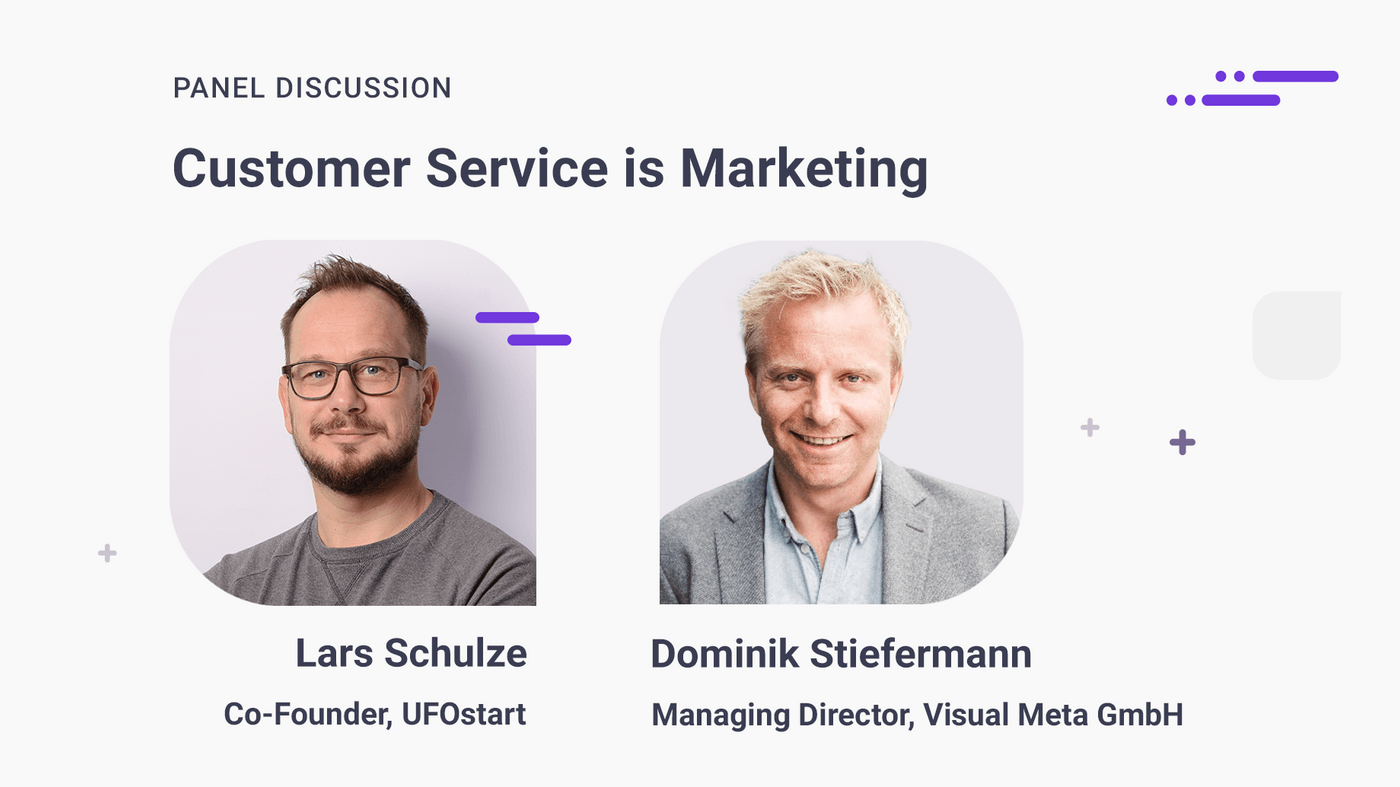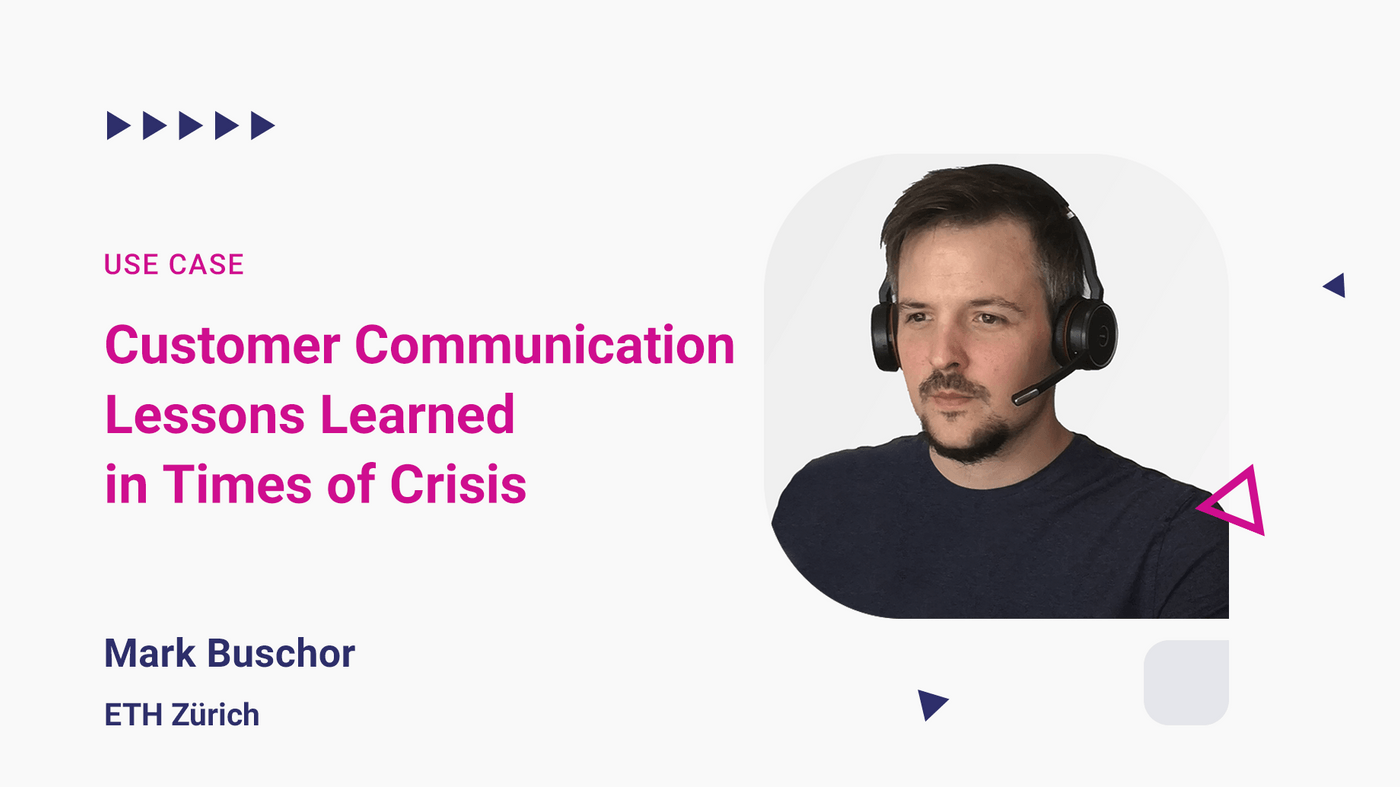Professional Voices
Panel Discussion - Customer Service is Marketing
In the panel discussion at the OMQ Rooftop event, we discussed how good customer service is also good marketing.

The things we talked about in our masterclass were also a topic of discussion at our Rooftop Event. Our CEOs Matthias Meisdrock and Sven Engelmann held a panel discussion with marketing experts Dominik Stiefermann and Lars Schulze.
Sven: Before we start, we would like to know whether you have had some good or bad customer experience lately that you would like to share with us.
Dominik: My horror experience right now is to get a new identity card at the Bürgeramt. There are like 500 different links that you can click, yet they won’t get you an appointment. This is a disaster.
Lars: I commuted from Brandenburg to Berlin for 20 years and my most extreme experience was on the train. We got stuck on the train in the middle of nowhere. I then tried to call the Deutsche Bahn hotline and was basically just turned away by the support staff – there was no help at all. I thought: ‘Okay, let’s go public then’ and tweeted about the situation. There were instructions on Twitter about what to do, how to help and so on. I had a realisation that was totally important: Social media makes issues public and thus the companies really have to react.
Matthias: We’ve also learned that when companies don’t take care of their customer service, at some point the requests arrive through social media. Everyone will see the bad experiences then. For this reason, we also think that many bad customer reviews are also due to the fact that certain customer communication channels do not work or the service does not help properly. I’ve got another question for you, Lars: What experiences have you had in your professional life?
Lars: Two points: As a startup, you have the challenge that not everything works out. It’s normal at first. What I have learned is firstly: Customers like honesty and transparency. Secondly: think about how to deal with the situation. In fact, we have been able to turn some customers who might have rated us with one star at the beginning to five stars, because through this active support in customer service they noticed: ‘Okay, they’re really trying to solve my problem’. It’s a very interesting experience for me to be able to reverse these negative experiences. The most frightening thing, in my years of self-employment is that once there was a board that was against setting up a Facebook page because they thought it would be torn up in the air by the customers. So they were afraid of the hate speech! You have to imagine: There’s a CEO who knows his product is bad. I think Jeff Bezos said many years ago that you should put the money not only into marketing, but also into the customer experience and the product. For many services, the customer service experience is of course part of the product. Matthias: I think before our discussion, I’ve talked about Amazon and Customer Service with you, Dominik. What do you think of reviews and customer service, does it all relate to and interact with each other?
Dominik: I think Amazon grew with it. Always do everything for the customer. I think an even nicer example is actually Zappos, they’ve always done it very extreme. There are anecdotes that the managing director has said: “Even if someone calls and says ‘Order me a pizza’ – just order him a pizza, as long as he is satisfied with us.” I think these are not just fairy tales, Zappos Powered by Service’ – was later also bought by Amazon. I think this is extremely important. On the one hand, the product review, which is like a glass factory. You can look in and have information you would never get otherwise. This is similar with customer reviews about a shop. If a shop has bad delivery times, bad return times or the like, that is very uncomfortable and is not fun. I personally do not believe that such a company will be successful. I also think that Amazon lost money for years, but at the end of the day it won because they always said: Everything for the customer. Obviously, the bill paid off.
Matthias: Yes, we agree. But the problem is, especially for shops that don’t have a financial background, to make customer service work well for everyone, but not to drive up expenses at the same time. There are technical solutions for this, and we make one ourselves. What do you think of systems like ours that make customer service easier? Do you see this as an important development for customer service and customer-business interaction to use such services?
Dominik: I think so, because you can cover all the simple things and then you can take time for the complex, more complicated issues. This is important. You will never be able to completely replace the direct customer contact, but once you can take care of the standards relatively easily and still make the customer happy, you can conquer the complicated cases. We are currently investing an awful lot in the B2B sector. We have our customers who want to compare products on our platform, but we also have a direct relationship with shops. We’re investing a lot in technology right now, so that, for example, the marketing manager can manage their simple processes himself, so that we can take the time with the same staff to handle more difficult cases, complicated issues, etc.

Matthias: That’s exactly our opinion, that you should try to answer the simple cases, that is, the ones that are asked 200-400 times a day, with a software. The customer actually wants to have a solution right away, he doesn’t necessarily want to talk to an employee or wait two weeks for an answer. This means that you always have to try to give the customer an answer right away. Lars, would you like to say something about that?
Lars: Absolutely. I am on the marketing side, so to speak, and with all the channels we have to serve today, we would be overwhelmed. When customers reach out on Instagram, WhatsApp, Facebook etc., you have to be the “master of the situation” and internal automation helps. We can measure which questions are asked the most, how to answer them best, which answer quickly leads to a result. Sharing this knowledge across all channels to the call center is, I think, extremely important. What’s ahead of us is that the world is becoming more and more global. Today, you have to remember right from the start that the big new products (e.g.Twitch) are global relatively quickly. When you have to answer in a variety of languages, you need automation, otherwise it won’t work.
Sven: Lars, you mentioned a topic earlier, which is also very interesting – the Facebook page. We have also learned that it is very important to not only operate one channel, but many. The topic of chatbots is usually very relevant and companies often forget that there are many other communication channels through which you can get in touch with customers. Have you already had experiences with the topic Chatbot?
Lars: It’s a bit like in the forums before, when someone asked a question and the answers came: “Look up there, we talked about that yesterday, the day before yesterday… already.” That’s exactly how I feel now on social media, that you have to explain the same thing all day long. Chatbots are a simple solution. People also expect a quick response. Customers are at the point of sale, they are interested in the product and ask a question – there needs to be help immediately.
Dominik: If you want to approach the subject, you have to master a lot of disciplines and bring out a different way of thinking. I think it is actually incredibly difficult for many companies to be able to respond in such a direct way. In order to be able to do this, you also have to change entire processes. Although I believe that the normal CallCenter employees are also trained in using text modules.
Lars: Maybe one more thing about Hubspot, which was very interesting, is that the customer journey was always depicted in a linear way. Two years ago or so, Hubspot turned it into a circle. Customer service doesn’t stop abruptly, but goes on and on. For me, marketing and customer support are linked.
Dominik: Ideally, before the purchase, right? You know that from clothing stores, that you are usually asked directly: “Can I help you?” - that’s annoying sometimes. But also in online shops I see this more and more often and it is sometimes really nice to be picked up directly. Be it manually or via chatbot. I think it’s going to come more and more. That you start before buying and then go straight to the communication path, which can also take place relatively automatically, because you can basically see the user movement. What is the customer looking at? Is it the second time he’s been on the website? Did he click on a banner? You already know that the customer is interested and can start direct communication even before the purchase.

Sven: What Matthias mentioned at the beginning plays a role here. Before I decide to buy something, I’ll get some information. Then the issue of customer reviews is important again. So the circle closes again. So how can you counteract negative reviews with good customer service.
Lars: Well, honestly, for a lot of things that don’t matter to me, I go on Amazon, look for an item that has five stars and then buy it. You don’t need any more research. That’s exactly how I feel about companies: You just have a better feeling. Of course, you know in the back of your mind that there may be a few optimized customer reviews, but you can rely on that in itself. I think customer reviews are important in B2B, as you just said, Dominik. Recommendation marketing is the be-all and end-all. If you are recommended something, whether digital or not, is a very important multiplier and you don’t even bother to do your own research.
Matthias: But I think there’s one more important point that one of you mentioned earlier, that customer service can turn people around again to give a good rating. It is often the case that customer service is involved in reviews.
Dominik: If you have a bad product, you don’t stand a chance, that’s obvious, but in fact customer service is the most important thing. Things can always go wrong. There are so many things that can happen, but you can solve everything. You can talk about anything. I think customer ratings depend primarily on customer service.
Lars: For me, it’s like that when you look back at Amazon’s customer service. Ebay wanted to make it similar, and didn’t get away from its customer support. At some point I didn’t order anymore, because you were left completely alone. If you’re a trader at Amazon today, you’re out right away. Everything is done for the customer. They used to laugh at Jeff Bezos for it.
Sven: Yes, we just tased you as an Early Adopter. If you had visions of what customer service should be like so early on, what will your perfect world look like in the future? Do you have subjects like this where you say that maybe everyone should take an example?
Dominik: I just found Matthias’s example very nice because it was optimized so Journey, that with the package where you are in one place, the data is used and you are directly helped in a simple and simple way. I think it’s cool that you get direct help with a problem without hurdles. I think it has to go further.
Lars: What I wish is that personality is important in customer service and that you might still be able to feel a bit more personal customer support, despite the automation and standardization. This may not be possible because of some data protection regulations, but perhaps we will find some solutions.
Sven: I would say that we have discussed marketing and customer service issues well. Thank you for the time you took for us! Thank you very much.
What’s your opinion?
We’ve already mentioned some aspects of customer service in our panel discussion. If you want to share your own opinion and experience with us, you can contact us here. We look forward to hearing from you! :)



